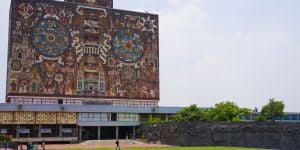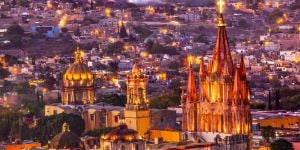Mexico is a fantastic destination for expatriates. The mere mention of the country’s name conjures up images of colourful fiestas, cheerful people, spicy food, tropical beaches, and towering volcanoes.
According to the World Tourism Organization, Mexico was the 7th most visited country in 2018 and the most popular Latin American destination. Its official language is Spanish, but many other native languages are also spoken there.
Politics in Mexico
Mexico is a republic consisting of 32 states. Executive, legislative, and judiciary powers are divided between the federal, state, and municipal levels.
Economy in Mexico
According to the World Bank, Mexico's Gross Domestic Product (GDP) amounted to 1.2 trillion USD in 2018. The country offers various professional opportunities to students, workers, entrepreneurs, and investors thanks to a dynamic labour market. Moreover, economic forecasts for the country are highly positive.
Climate in Mexico
Mexico's climate is roughly divided into three types: the temperate altiplano (high mountain plateau) in the centre of the country, the tropical areas along the Pacific, Caribbean, and Gulf coasts, and the desert Northern area. Rainfall varies according to different seasons and geography. Most regions have a rainy season in late summer or fall that typically lasts a month. The coastal regions experience hurricanes from June to November. Snow occasionally falls in the deserts of the north and on the peaks of the large volcanoes scattered along the altiplano.
History and culture in Mexico
Mexico has a rich cultural and historical heritage influenced by the mixing of Spanish invaders and highly developed native populations. Two of the most important were the Aztecs whose capital was what is now Mexico City, and the Mayans who established their territory along the Yucatan Peninsula and the states of Chiapas, Campeche, Quintana Roo, and Tabasco, to Belice, Guatemala and Northern Honduras.
Mexico's War of Independence began in 1810, and it is widely celebrated in Mexico on September 16th. One hundred years later in 1910, the Revolution swept across the country, culminating in the march in Mexico City by two important generals: Emiliano Zapata from the south and Pancho Villa from the north.
Today, Mexican culture is manifested in the importance of the family, a rich culinary tradition, distinctive musical styles, and unique holidays such as the Day of the Dead, when Mexicans honour their deceased relatives by decorating their graves and placing a shrine in their homes full of food, flowers, and photographs.
Useful links:
Magic Towns in Mexico
Visit Mexico webpage
Mexico Desconocido webpage (in Spanish)
The Day of the Dead
We do our best to provide accurate and up to date information. However, if you have noticed any inaccuracies in this article, please let us know in the comments section below.











